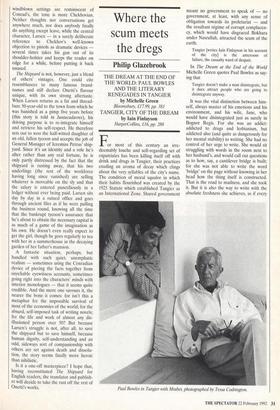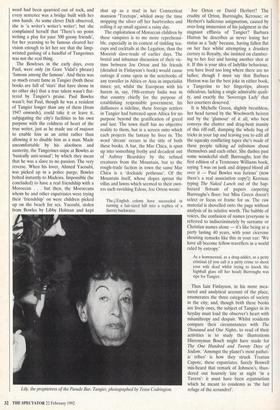Where the scum meets the dregs
Philip Glazebrook
THE DREAM AT THE END OF THE WORLD: PAUL BOWLES AND THE LITERARY RENEGADES IN TANGIER by Michelle Green Bloomsbury, f17.99, pp. 381 TANGIER, CITY OF THE DREAM by lain Finlayson HarperCollins, f16, pp. 288 For most of this century an irre- deemably louche and self-regarding set of expatriates has been killing itself off with drink and drugs in Tangier, their practices exuding an aroma of decay which clings about the very syllables of the city's name. The condition of moral squalor in which their habits flourished was created by the 1925 Statute which established Tangier as an International Zone. Shared government
meant no government to speak of — no government, at least, with any sense of obligation towards its proletariat — and the resultant regime of corrupt complacen- cy, which would have disgraced Bokhara under Nasrullah, attracted the scum of the earth.
Tangier [writes lain Finlayson in his account of the city] is the anteroom of failure, the casualty ward of despair.
In The Dream at the End of the World Michelle Green quotes Paul Bowles as say- ing that
Tangier doesn't make a man disintegrate, but it does attract people who are going to disintegrate anyway.
It was the vital distinction between him- self, always master of his emotions and his environment, and his wife, Jane, who would have disintegrated just as surely in Bognor Regis. For she was an addict: addicted to drugs and lesbianism, but addicted also (and quite as dangerously for her mental stability) to writing. She had no control of her urge to write. She would sit struggling with words in the room next to her husband's, and would call out questions as to how, say, a cantilever bridge is built; for she was not able to write the word `bridge' on the page without knowing in her head how the thing itself is constructed. That is the road to madness, and she took it. But it is also the way to write with the absolute freshness she achieves, as if every Paul Bowles in Tangier with Mrabet, photographed by Tessa Codrington. word had been quarried out of rock, and every sentence was a bridge built with her own hands. As some clever Dick observed, she is 'a writer's writer's writer'; but she complained herself that 'There's no point writing a play for your 500 goony friends', for her yearning to be famous cleared her vision enough to let her see that the limp- wristed gushing of a handful of Tangerines was not the real thing.
The Bowleses in the early days, even Paul, were only (in Gore Vidal's phrase) `famous among the famous'. And there was so much ersatz fame in Tangier (both these books are full of 'stars' that have shone in no other sky) that a true talent wasn't flat- tered by Tangier's praise. Paul Bowles wasn't; but Paul, though he was a resident of Tangier longer than any of them (from 1947 onwards), could take it or leave it, subjugating the city's facilities to his own purpose with the coldness of heart of the true writer, just as he made use of majoun to enable him as an artist rather than allowing it to disable him as a man. Made uncomfortable by his aloofness and austerity, the Tangerines snipe at Bowles as 'basically anti-sexual'; by which they mean that he was a slave to no passion. The very reverse. When his lover, Ahmed Yacoubi, was picked up in a police purge, Bowles bolted instantly to Madeira. Impossible (he concluded) to have a real friendship with a Moroccan . . . but then, the Moroccans whom he and other expatriates were trying their 'friendship' on were children picked up on the beach for sex. Yacoubi, stolen from Bowles by Libby Holman and kept shut up as a stud in her Connecticut mansion 'Treetops', whiled away the time stripping the silver off her hairbrushes and rolling it up small against a rainy day.
The exploitation of Moroccan children by these vampires is to me more reprehensi- ble, especially in its context of tinkling tea- cups and cocktails at the Legation, than the Moorish slave-trade of earlier days. The brutal and inhuman discussion of their vic- tims between Joe Orton and his friends (detailed in Finlayson's book) would cause outrage if come upon in the notebooks of any traveller in Africa or Asia in imperialist times; yet, whilst the European with his harem in, say, 19th-century India was in that country chiefly for the purpose of establishing responsible government, his dalliances a sideline, these foreign settlers in Tangier had battened upon Africa for no purpose beyond the gratification of greed and lust. The town itself has no objective reality to them, but is a screen onto which each projects the fantasy he lives in. The word 'dream' occurs in the title of both these books. A bar, the Mar Chica, is spun up into something frothy and decadent out of Aubrey Beardsley by the refined creatures from the Mountain, but to the rough-trade faction in town the same Mar Chica is a 'dockside pothouse'. Of the Mountain itself, whose slopes sprout the villas and lawns which seemed to their own- ers such ravishing Edens, Joe Orton wrote:
The. English colony have succeeded in turning a fair-sized hill into a replica of a Surrey backwater.
Lily, the proprietress of the Parade Bar, Tangier, photographed by Tessa Codrington. Joe Orton or David Herbert? The crudity of Orton, Burroughs, Kerouac; or Herbert's ludicrous astigmatism, caused by over-long immersion of his judgment in the stagnant effluvia of Tangier? Barbara Hutton he describes as never losing her status as a 'lady' because, having fallen flat on her face whilst attempting a drunken curtsey to Royalty, she insisted on clamber- ing to her feet and having another shot at it. If this is your idea of ladylike behaviour, you have lived too long where there are no ladies; though I must say that Barbara Hutton was far the best joke in either book, a Tangerine to her fingertips, always ridiculous, lacking a single admirable quali- ty, and exactly the 'Sovereign Lady' that her courtiers deserved.
It is Michelle Green, slightly breathless, her head turned by the Woolworth heiress and by the 'glamour' of it all, who best conveys the chatter and drug-bent inanity of this riff-raff, dumping the whole bag of tricks in your lap and leaving you to edit all the squeaky conflicting tapes she's made of these people talking ad infinitum about themselves and each other. She dashes past some wonderful stuff: Burroughs, lent the first edition of a Tennessee Williams book, saying 'I was on junk and dripped blood all over it — Paul Bowles was furious' (now there's a real association copy!); Kerouac typing The Naked Lunch out of the hap- hazard flotsam of papers carpeting Burroughs's floor: but Miss Green doesn't select or focus or frame for us. The raw material is shovelled onto the page without analysis of its relative worth. The babble of voices, the confusion of names (everyone is referred to indiscriminately by surname or Christian names alone — it's like being at a party lasting 40 years, with your cicerone shouting remarks like this in your ear: 'We have all become fellow-travtllers in a world ruled by entropy.'
As a homosexual, as a drug-addict, as a petty criminal (if you call it a petty crime to shoot your wife dead whilst trying to knock the highball glass off her head) Burroughs was ripe for Tangier.
Thus lain Finlayson, in his more mea- sured and analytical account of the place, enumerates the three categories of society in the city; and, though both these books are lively ones, the subject of Tangier in its heyday must load the observer's heart with misanthropy and despair. Whilst residents compare their circumstances with The Thousand and One Nights, to read of their activities is to study the illustrations Hieronymus Bosch might have made for The One Hundred and Twenty Days of Sodom. 'Amongst the planet's most pathet- ic tribes' is how they struck Truman Capote, these expatriates. Surely Boswell mis-heard that remark of Johnson's, thun- dered out hoarsely late at night 'in a Tavern': it must have been expatriatism which he meant to condemn as 'the last refuge of the scoundrel'.



















































 Previous page
Previous page